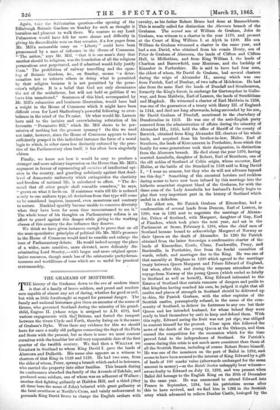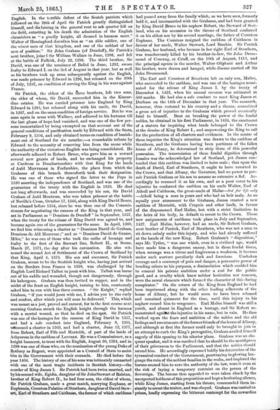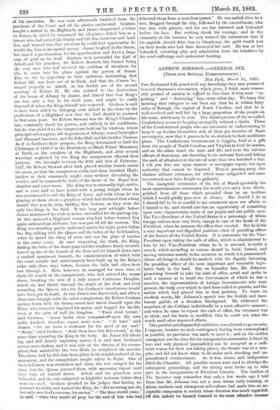THE GRAHAMS OF MONTROSE.
rpHE history of the Grahams down to the eve of modern times
is that of a family of brave soldiers, and proud and resolute men capable of almost any act of daring, whether for good or evil, but with as little forethought as regard for personal danger. '1 he family and national historians give them an ancestor of the name of Greme, who governed Scotland during the minority of his grand- child, Eugene IL (whose reign is assigned to A.D. 419), had various engagements with the: Britons, and forted the rampart between the rivers Clyde and Forth, thereby fixing on it the name of Graham's Dyke. Were there any evidence for this we should have for once a really old pedigree connecting the days of the Picts and Scots with the present, but as there is none we must content ourselves with the humbler but still very respectable date of the first quarter of the twelfth century. We find then a WILLIAM DE GRAHAM in Scotland to whom King David I. gave the lands of Abercorn and Dalkeith. His name also appears as a witness to charters of that King in 1128 and 1139. He had two sons, from the elder of whom, Peter, sprang a branch which ended in heiresses, who carried the property into other families. This branch during its continuance absorbed the family of the Avenels of Eskdale, and produced some soldiers, one of whom was an adherent of Wallace ; another died fighting gallantly at Halidon Hill, and a third (they all three bore the name of John) behaved with great gallantry at the fatal overthrow at Neville's Cross, and vainly endeavoured to persuade King David Bruce to charge the English archers with
cavalry, as his father Robert Bruce had done at Bannockburn. This is usually called for distinction the Abercorn branch of the Grahams. The second son of William de Graham, John de Graham, was witness to a charter in the year 1170, and present at the Court of King William L at Alyth in 1200. His son William de Graham witnessed a charter in the same year, and had a son, David, who obtained from his cousin Henry, son of Peter de Graham of Abercorn, the lands of Clifton and Clifton Hall, in Midlothian, and from King William I. the lands of Charlton and Barrowfield, near Montrose, and the lordship of Kinnaber in Forfarshire. He is said to have had four sons,. the eldest of whom, Sir David de Graham, had several charters during the reign of Alexander H., among which was one from Patrick, Earl of Dunbar, of two toffs of Melekston. He had also from the same Earl the lands of Dundaff and Strathcarron, formerly the King's forest, in exchange for Gartonquhar in Gallo- way, and from Maldwin, Earl of Lennox, the lands of Strathblane and Mugdock. He witnessed a charter of Earl Mahiwin in 1238, was one of the guarantees of a treaty with Henry III. of England in 1244, and died not long afterwards, being succeeded by his son, Sir David Graham of Dundaff, mentioned in the chartelary of
Dumfermline in 1233. He was one of the anti-English party- removed from the administration of affairs during the minority of Alexander III., 1255, held the office of Sheriff of the county of Berwick, obtained from King Alexander III. charters of his whole lands, and acquired from his brother-in-law, Maine, Earl of Strathern, the lands of KINCARDINE in Perthshire, from which the family for some generations took their designation, in distinction from the Abercorn branch. He died about the year 1270, having married Annabelle, daughter of Robert, Earl of Strathern, one of the old nobles of Scotland of Celtic origin, whose ancestor, Earl Maize, at the battle of the Standard in 1138 said to King David I., "I wear no armour, but they who do will not advance beyond me this day." Something of this ancestral heroism and reckless- daring seems to have now been infused by this marriage into the hitherto somewhat stagnant blood of the Grahams, for with the- three sons of the Lady Annabelle her husband's family begin to play that very important part in the history of Scotland which. ended in a dukedom.
The eldest son, Sir Patrick Graham of Kincardine, had a
confirmation of several lands from Duncan, Earl of Lennox, ire 1280, was in 1281 sent to negotiate the marriage of Alexan- der, Prince of Scotland, with Margaret, daughter of Guy, Earl of Flanders, which took place the next year, and sat in the- Parliament at Scone, February 5, 1284, when the chief men of
Scotland became bound to acknowledge Margaret of Norway an-
their Queen on the death of Alexander. In 1285 Sir Patrick obtained from the latter Sovereign a confirmative charter of the lands of Kincardine, Cowle, Clune, Foschwallis, Prony, and Barderallis, in Perthshire, free from the feudal casualties of wards, reliefs, and marriages due to the King. He was one of that assembly at Brigham in 1290 which agreed to the marriage treaty between Queen Margaret and Prince Edward of England,. but when, after this, and during the suspense attendant on the voyage from Norway of the young Queen (which ended so fatally to Scotland as well as herself), King Edward intimated to the Estates of Scotland that certain rumours of dangers and perils to that kingdom having reached his ears, he judged it right that all castles and places of strength in Scotland should be delivered up to .him, Sir Patrick Graham, with the other captains of the Scottish castles, peremptorily refused, in the name of the com- munity of Scotland, to deliver its fortresses to any one but their- Queen and her intended husband, for whose behoof they were ready to bind themselves by oath to keep and defend them. With. thisreply, Edward seeing the fruit was not yet ripe, was obliged to content himself for the present. Close upon this followed the news of the death of the young Queen at the Orkneys, and than ensued the competition for the succession which for the time proved fatal to the independence of Scotland. Sir Patrick's. course daring this crisis is not much more consistent than those of all the Scottish Barons, including of course Robert Bruce himself- He was one of the nominees on the part of Balled in 1292, and.
seems to have been secured to the interest of King Edward by a gift of lands of 100 marks value (afterwards exchanged for the same amount in money)—so the Rotuli Scotia unhappily bear witness— swore fealty to Edward on July 12, 1292, and was present when Baliol did homage to the English King on the 20th of December in the same year. He was summoned to attend Edward. into France in September, 1294, but his patriotism seems after this to have revived, and we find him in 1296 in the Scottish army which advanced to relieve Dunbar Castle, besieged by the was made prisoner by Edward in 1296, but released on the 30th The Earl and Countess of Strathern left an only son, Malise, of July, 1297, on condition of serving the King in his wars against who succeeded to the earldom, and was one of the hostages nomi- and had a safe conduct into England, February 8, 1361, feelings and resentments of the formerfriends of the house of Albany, witnessed a charter in 1369, and had a charter, June 13, 1377, and although at first the former could only be brought to join in from Robert, Earl of Fife and Menteith, of part of the lands of an attempt to curb the King's prerogative, Graham availed himself Achynross in the earldom of Levenax. He was a Commissioner, as a eagerly of this opening to his ulterior plans. Graham was an elo- knight banneret, to treat with the English, August 30, 1394, and in quent speaker, and it was resolved that he should be the mouthpiece 1398 was one of those who, on the nomination of the young Duke of of their grievances to the Parliament, and that the nobles should Rothsay as Regent, were appointed as a Council of State to assist second him. He accordingly expressed boldly his detestation of the him in the Government with their counsels. He died before the tyrannical conduct of the Government, pourtraying in glowing len- year 1404. The history of one of his eons was intimately connected guage the ruin of the noblest families in the realm, and implored the with one of the most tragic incidents in Scottish history-the barons around him to save the authority of the law, were it even at murder of King James I. Sir Patrick had been twice married, and the risk of laying a temporary restraint on the person of the byhis second wife, Egidia, daughter of Sir johnStewart of Ralston, Sovereign. The barons thus appealed to were taken aback by the brother of King Robert H., he had four sons, the eldest of whom, unexpected boldness of this proposition and kept a hesitating silence,
Sir Patrick Graham, made a great match, marrying Euphane, or while King James, starting from his throne, commanded them in- Euphemia, Countess Palatine of Strathern, daughter of David Stew- stantly to arrest the traitor, and was obeyed. Graham was carried to art, Earl of Strathern and Caithness, the former of which earldoms prison, loudly expressing the bitterest contempt for the cowardice
English. In the tcrrible defeat of the Scotch patriots which had passed away from the family which, as we have seen, formerly followed on the 28th of April Sir Patrick greatly distinguished held it, and intermarried with the Grahams, and had been granted himself, and disdaining in the general rout to ask quarter fell on by King David Bruce to his nephew Robert, the Steward of Scot-
the field, extorting in his death the admiration of the English land, who on his accession to the throne of Scotland conferred chroniclers as " a goodly knight, all dressed in harness meet." it on his eldest son by his second marriage, the father of Countess
Walter of Hemingford describea him as " an able soldier, one of Euphane. The Countess resigned the etuidom of Caithness in
the wisest men of that kingdom, and one of the noblest of her favour of her uncle, Walter Stewart, Lord Brechin. Sir Patrick men of position." Sir John Graham (of Dundaff), Sir Patrick's Graham, her husband, who became in her right Earl of Strathern,
next brother, joine i Sir William Wallace in June, 1298, and fell was treacherously killed by his brother-in-law, Sir John Drum- at the battle of Falkirk., July 22, 1298. The third brother, Sir mond of Concrag, at Crieff, on the 10th of August, 1413, and David, was one of the nominees of Ballot in June, 1292, swore the principal agents in the murder, Walter Oliphant and Arthur fealty to Edward L on the 3rd of August in that year, but as well his brother, were drawn and hanged, while disease carried off Sir as his brothers took up arms subsequently against the English, John Drummond.
was made prisoner by Edward in 1296, but released on the 30th The Earl and Countess of Strathern left an only son, Malise, of July, 1297, on condition of serving the King in his wars against who succeeded to the earldom, and was one of the hostages nomi- France. mated for the release of King James I. by the treaty of
of his associates. He was soon afterwards banished from the precincts of the Court and all his estates confiscated. Graham sought a retreat in the Highlands, and thence despatched a letter to James, in which he renounced his allegiance, defied him as a tyrant who had ruined his family and left him houseless and land- less, and warned him that wherever he could find opportunity he would slay him as his mortal enemy. James laughed at the threat, but issued a proclamation for his apprehension and fixed a large sum of gold on his head. Graham next persuaded the Earl of Atholl and his grandson, Sir Robert Stewart, the former being the very man who had received the earldom of Strathern for life, to enter into his • plans against the person of James. This he did by appealing to their ambition, insinuating that Robert III, was born out of wedlock, and that the Crown be- longed properly to Atholl, as the lawful son of the second marriage of Robert II. He also pointed to the destruction of the house of Albany by James, and hinted that that King's son was only a boy in his sixth year, and might be easily disposed of when the King himself was remoired. Graham is said to have been aided in bringing over Atholl to his views by the predictions of a Highland seer that the Earl should be crowned in that same year. Sir Robert Stewart was the King's Chamber- lain, constantly about his person, and entirely in his confidence, but he also yielded to the temptations held out by Graham, whose principal other agents, old dependents of Albany, were Christopher and Thomas Chambers, and Sir John Hall and his brother Thomas. As if to facilitate their purpose, the King determined to hold the Christmas of 1436-7 in the Dominican or Black Friars' Monastery at Perth, on the outskirts of the Highlands, and after several warnings neglected by the King the conspirators effected their purpose. On the night between the 20th and 21st of February, 1437, Sir Robert Stewart after dark placed wooden boards across the moat, so that the conspirators (who had three hundred High- landers at their command) might enter without disturbing the warder, and he removed the bolts of the doors of the Royal bed- chamber and outer room. The King was in unusually high spirits, and is even said to have jested with a young knight whom he was accustomed to call the King of Love, and with whom he was playing at chess, about a prophecy which had declared that a king should that year be slain, bidding him beware, as they were the only two kings in the tend. It was long past midnight before James 'announced his wish to retire, and called for the parting cup. At this moment a Highland woman who had before warned him again entreated an audience, but was put off till the morrow. The King was standing partly undressed and in his night-gown before the fire, talking with the Queen and the ladies of the bedchamber, when he heard the clang of arms and saw the glare of torches in the outer court. At once suspecting the truth, the King, finding the bolts of the doors gone and the windows firmly secured, forced up one of the boards of the floor and let himself down into a vaulted apartment beneath, the communication of which with the court outside had unfortunately been built up by the King's order only three days before, because the balls had often been lost through it. Here, however, he managed for some time to elude the search of the conspirators, who had entered the rooms above, breaking the arm of a lady named Catherine Douglas, which she had thrust through the staple of the dm*, and even wounding the Queen, who but for Graham's interference would have been put to death. At last James was discovered, and after a desperate struggle with the other conspirators, Sir Robert Graham sprang down with his drawn sword and threw himself upon the King, who earnestly implored his mercy, and begged for his life even at the price of half his kingdom. "Thou cruel tyrant," said Graham, "never hadst thou compassion* upon thy own noble kindred, therefore expect. none now." "At least," said James, "let me have a confessor for the good of my soul." "None," cried Graham, "shalt thou have but this sword," at the same time wounding the King in the body. As James fell bleed- ing and still faintly imploring mercy, it is said that Graham's nerves were shaken, and it was only on the threats of his accom- plices that, assisted by the two Halls, he completed the murder. The alarm had by this time been given in the neighbourhood of the monastery, and the conspirators sought safety in flight. One of their followers was overtaken and slain, the rest escaped for the time, but the Queen pursued them with unceasing vigour until they were all hunted down. Atholl and his grandson were beheaded, and the rest subjected to frightful tortures before they were executed. Graham pleaded to his judges that having re- nounced his fealty and warned the King, he "did no wrong nor sin, but only slew God's creature, his enemy." "The time would come," he said, "when they would all pray for the soul of him who had delivered them from a merciless tyrant." He was nailed alive to a tree, dragged through the city, followed by the executioners, who tore him with pincers, and his son was tortured and beheaded before his face. But nothing shook his courage, and in the extremity of his tortures he only warned his tormentors that if his anguish should drive him to blasphemy, the guilt would rest on their heads who had thus destroyed his soul. He was at last beheaded, extorting- pity and admiration from the beholders by his cruel sufferings and undaunted bearing.
































 Previous page
Previous page